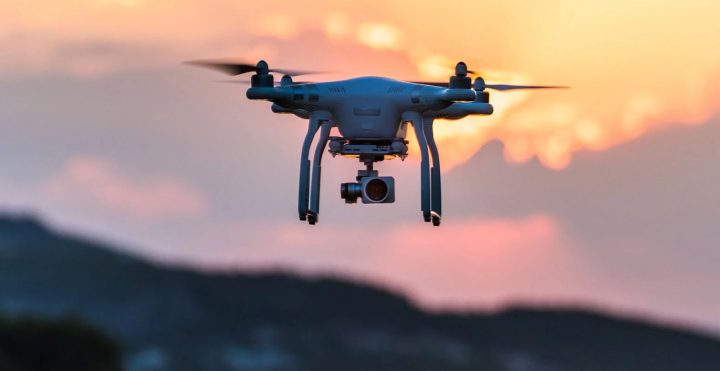ISS TODAY OP-ED
Drones as weapons — Africa urgently needs better data to anticipate growing aerial risk

A lack of documented evidence leaves the continent vulnerable and ill-equipped to shape an evolving policy debate.
In October this year, Africa’s air force chiefs of staff and air force industry representatives gathered in Senegal. They agreed the continent urgently needed to develop sophisticated air defences in response to a growing threat — the proliferation of unmanned aerial systems (UAS), or drones.
Drones offer huge potential for Africa in terms of economic development and human security, such as monitoring weather patterns off Mozambique’s coast or delivering medicines to remote areas of Malawi. But technology can also be weaponised by unconventional forces. It shifts the balance of power away from states with the largest armies and arsenals, to insurgent groups or terrorist organisations. Drones have also become a favoured tool of criminal networks and lone actors.
Most media focus has been on the use of larger military drones by conventional armies and their impact on international humanitarian law. But commercial or hobbyist drones are becoming part of the toolkit of violent threat ‘actors’ not only in the Middle East and the Russia-Ukraine conflict, but also across Africa.
Like improvised explosive devices (IEDs), which ‘democratised’ war by lowering the costs of using lethal force for non-state entities, the psychological impact of a weaponised drone in the hands of an insurgent is perhaps as important as its physical impact.
It essentially amplifies a threat group’s potency by enabling it to control or deny territory from the air, or gather intelligence or propaganda material. In extreme cases, drones can be armed with explosives or other hazardous weapons that can be deployed by an aerial asset that is hard to detect. Recent reportage from Ukraine shows how hobbyist drones have been fitted with mechanisms allowing grenades to be dropped from the air.
Read more in Daiy Maverick: Kyiv drones strike Russia’s Kursk; Ukrainian grain reaches Turkey through the Black Sea
The global focus has been on the adaptation of hobbyist drones in Iraq, Syria, Yemen and now Gaza, with reports of Hamas using drones to attack Israel Defense Force observation towers, and deploying swarms of drones to target naval vessels. But militant groups in Africa including Boko Haram, Islamic State West Africa Province (Iswap) and al-Shabaab, appear to be watching and learning.
Information sharing
These groups are reportedly using their global and ‘dark networks’ (illegal and covert links) to acquire and modify drones, says Kerry Chávez, a political researcher at Texas Tech University and a fellow at the Modern War Institute at West Point. She told ISS Today that “network affiliations are the strongest predictors of adopting a drone programme”.
Given an active online community of hobbyist drone users, her ongoing analysis of social media platforms reveals that in Africa, “the role of transnational terror ties appears to be the main driver”. That is, social media and messaging platforms associated with al-Qaeda and Islamic State “share the knowledge of UAS they acquired in the Middle East and diffuse it across their affiliates in the Sahara-Sahel”.
A systematic mapping of drone use by designated terrorist organisations in Africa still needs to be undertaken. However, a preliminary assessment by Reuben Dass of the Royal United Services Institute showed that the increased “affordability and accessibility” of drone technology meant it posed “an increasing threat” across Africa. This was true whether it was used for propaganda, intelligence, surveillance or reconnaissance purposes.
He reminds us that in 2022, Iswap used quadcopter drones to shoot parts of a propaganda video showcasing its training camp in Nigeria. In July that year, “the surveillance drones used by Iswap were spotted over the position of Nigerian government forces just before the group carried out an ambush on them”. A similar use of drones for precision targeting suicide bombers has been widely documented in Mosul, northern Iraq.
The acquisition and type of drone appear to be influenced by the level of external support non-state actors receive, the amount of territory they control (particularly transport routes), and members’ technological know-how.
Mounting security threat
The possible deployment of drone swarms has created a sense of urgency in policy circles, with numerous United Nations resolutions and tabletop exercises with African policymakers among the target audience.
The Berlin Memorandum on Good Practices for Countering Terrorist Use of Unmanned Aerial Systems contains over two dozen recommendations that groups like the Global Counterterrorism Forum are pushing to apply. Among them are risk management measures that incorporate possible UAS use into routine assessments using available intelligence and ‘lessons learnt’ from other settings.
The memorandum also proposes enhanced information sharing at regional and national level, and urges states to ‘develop crisis planning and mitigation measures’ and ‘vulnerability assessments’ for critical infrastructure, e.g. energy sources and communications infrastructure.
At a regional level in Africa, organisations such as the Intergovernmental Authority on Development and the Economic Community of West African States could effectively communicate knowledge and risk. At a national level, aviation authorities and private drone associations are also resources for information exchange.
The recorded incidents of drone deployments by Africa-based armed groups may be limited. However, the lack of documented evidence and scholarship — and of an international database enabling threats to be classified — surely leaves the continent vulnerable and ill-equipped to contribute to an evolving debate. DM
Karen Allen, Consultant, Institute for Security Studies (ISS) Pretoria.
First published by ISS Today.




















 Become an Insider
Become an Insider
Comments - Please login in order to comment.